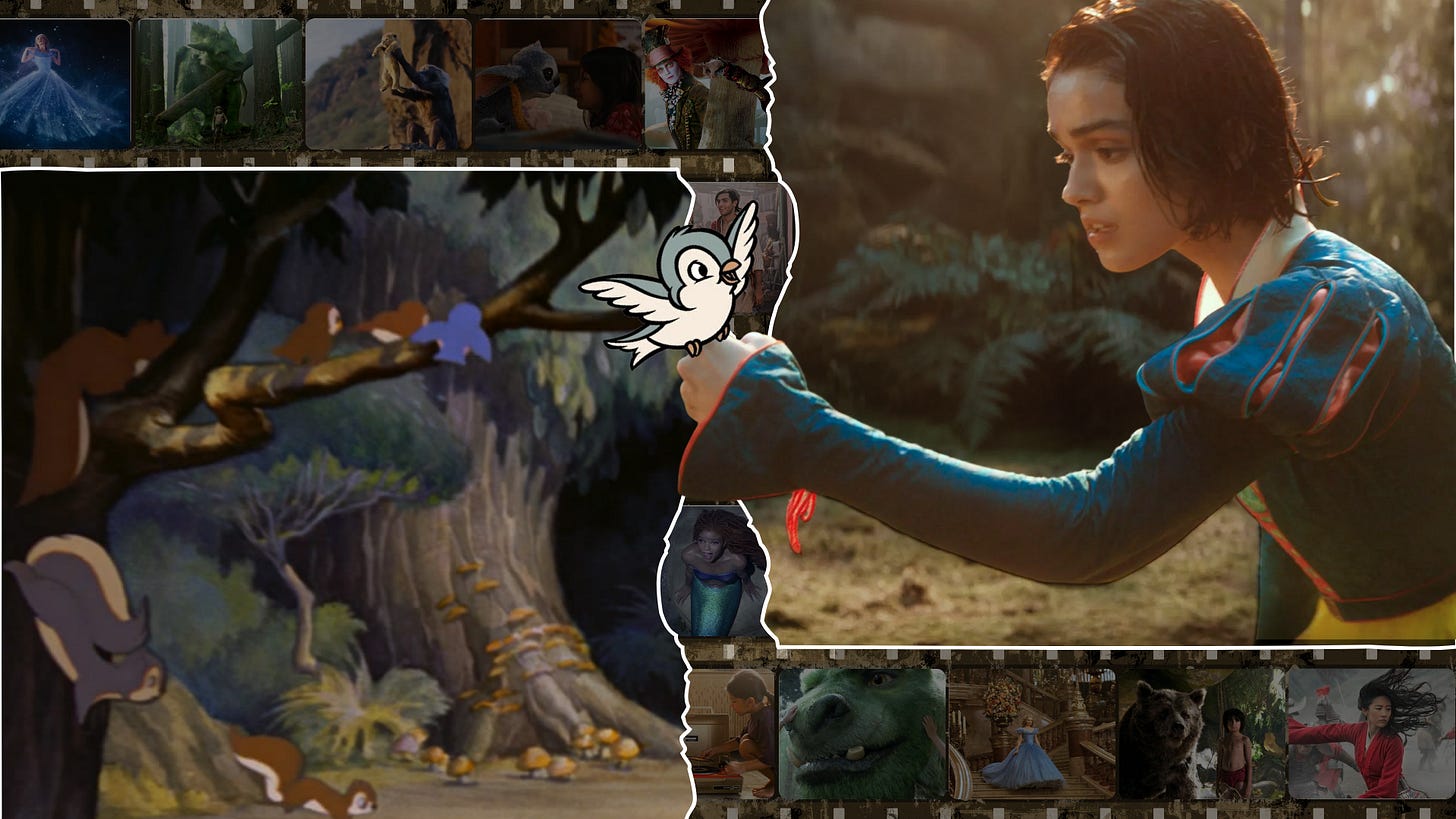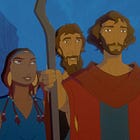Further Thoughts on Film Remakes, Adaptations, and the Canon
A continuation of last week's blog, "Disney Live Action Remakes and the Ship of Theseus"
Last week’s blog, Disney Live Action Remakes and the Ship of Theseus, spurned some incredibly thoughtful conversations from my readers. So today’s blog continues to evaluate remakes, this time looking at biblical adaptations, evolving storytelling methods, and how audiences may share the responsibility for this recent phenomenon.
What about biblical adaptations?
Given A Cloudy Picture’s focus on faith and film, a few questions asked in response to my article was how my Thesian Line system would apply to Bible story retellings in various media. As one reader put it, “are we more forgiving, in a way, of ever more versions of the life of Christ than we are of new movies of Disney stories? Are there similar trends in how close or distant a retelling is to the Bible and how popular it is?”
To cheat and take both sides of the argument, I think Christians are simultaneously more forgiving and more critical of stories about Christ and the Bible. With filmmaking tools and streaming releases now more accessible than ever, Christian filmmakers (and even studios) have seized the opportunity and released a plethora of biblical adaptations.
The Bible television show made headlines over a decade ago on History Channel, The Chosen has gone from a crowdfunded indie project to a theatrical and streaming behemoth, and this year alone we’ve seen two animated Jesus films released, The King of Kings and Light of the World. The success of these projects and praise for their mission proves that Christians are eager for biblical storytelling in modern media and accepting of the recent influx.
That said, I think Christians can often be more wary and protective of faith films than general audiences are of Disney remakes. I talked a bit about this in my analysis of The Book of Clarence, a wonderful film loosely (very loosely) based on the Bible, but that takes a lot of liberties in its storytelling.
Those liberties can make Christians uncomfortable. Whether it’s Titanic, Big Eyes, or Oppenheimer, viewers should always expect some embellishments or deviations from real life when watching biographical films. After all, “based on a true story” leaves a lot of leeway. Which parts are true? Which parts are purely for narrative stakes? It’s a component of any biopic or historical film that we’ve just come to accept as audiences.
However, that’s a much harder pill to swallow when it comes to biblical adaptations. After all, these aren’t just a set of true events. They’re events that led to Christians’ core beliefs, our identity in Christ, our way of living. So where most people can readily forgive James Cameron for making up a love story at the center of Titanic’s tragedy (a film full of interactions with real life crew and passengers), it’s not so easy to accept a new story set during Jesus’ ministry, full of fictional interactions with the apostles, Romans like Pontius Pilate, and even Jesus himself.
This makes The Book of Clarence a lot to digest, particularly for Christian audiences that may have been expecting a more traditional approach to both the subject matter and the filmmaking style. The Last Temptation of Christ is another terrific, but controversial film about the life of Jesus. Billy Graham called the film sacrilegious upon release, and it still faces censorship today, banned from streaming services in countries such as Singapore.
And so just as Christian audiences will accept faithful biblical film adaptations, they often reject and revile films that greatly reinterpret (or worse, mock) the events that shaped their faith.
I don’t appreciate having my faith mocked, but outside of mockery, I’m ultimately fairly lenient when it comes to watching biblical film adaptations. I’ve found that even the most deviant of biblical adaptations (including The Last Temptation of Christ) contain a multitude of biblical truths. And in these films’ differences from scripture arises an opportunity to critically think about my faith, the Bible, and the world around me.
What *exactly* is being remade?
Many of the other comments raised in my article revolved around what actually constitutes a remake. What exactly is being remade when we refer to the term? Of course, we have a variety of words to indicate different types of remakes: adaptation, legacy sequel, interpretation, edition. An adaptation or interpretation still feels like something new is being made because it requires an act of conversion, whether in format (from book to film) or in thematic readings. But the word “remake” seems to imply a sort of do-over that other words of its nature simply don’t.
The problem with “remake” as a term in general is due in no small part to the above implication. Take Disney’s Snow White (2025) remake for example. This wasn’t an adaptation or film interpretation of the classic fairy tale. It was a re-making of their own animated film from 1937. And when the primary text being referenced is that previous film, a dangerous game of Telephone is introduced to the world of storytelling.
If you’re not familiar with Telephone, it’s a game where players form a line and a message is whispered from person to person. The last player announces the final version, and it's compared to the original message. The goal is to pass the message accurately, but the fun of the game is that the message usually gets distorted and changes significantly by the end.
Similarly, if filmmakers are not referencing all texts (particularly the original texts) when creating a remake or adaptation, it risks the lessening of the original film’s meaning, or perhaps the erasure of the original altogether.
If we asked most adults the story of Snow White, the Little Mermaid, or Hercules, would the answers stem from their knowledge of the original fairytales and mythology? Or is our primary knowledge of those stories now rooted in the popular Disney films?
Now take that a step further. As Disney remakes their own films, what is the “primary text” that audiences will reference and remember? The newest film version of the story? The original animated film? The Grimms' fairy tale? To this end, several coworkers have mentioned to me their children' s preference for the new live action Aladdin or Beauty and the Beast rather than the animated ones.
Put another way, Disney’s new films aren’t remakes of the original fairy tale texts. They are remakes of their prior remake of the fairy tale. Which starts to bring in questions of canon and originality.
If this “Telephone” trend continues with further remakes that aren’t informed by the original texts, and future generations rejecting the original texts, these classic stories will look and feel like something entirely different.
This is further problematized by films about true stories and Biblical stories. Disney’s Pocahontas, despite being based on real people and events, bears little resemblance to the actual historical occurrences. I love the film as a Romeo & Juliet interpretation, but would caution any audiences from viewing its plot as a faithful portrayal of history. Indeed, most modern criticism of that film stems from how easy it is to assume the events portrayed are accurate to real life.
Even more concerning are the ramifications of biblical film remakes. Would a remake of The Prince of Egypt primarily reference the book of Exodus, or the Dreamworks animated film? Would a reinterpretation of Jesus Christ Superstar reference the gospels or merely riff on the stage musical’s plot and themes?
Thinking about the game of Telephone previously mentioned, let’s imagine that The Last Temptation of Christ was being remade by one of today’s prolific filmmakers. But rather than referencing the Nikos Kazantzakis novel or, of course, the biblical text, it was remade purely based on Scorsese’s 1988 film. Any changes that deviate from Scorsese’s film in this hypothetical remake mean it becomes even further removed from Kazantzakis’ novel, which is already several steps removed from the Bible.
How would non-Christian viewers start to think of Christ in such a situation? Would their perspective on him be built from this remake? Even worse, do biblical films run the risk of overtaking actual biblical truths by those unfamiliar with the Bible? I would hope not. But such a risk is run with any Biblical remake or adaptations. This certainly strengthens the Christian imperative to share the gospel all the more.
Who’s to blame here?
In both of my blogs on this topic, it seems easy to blame the filmmakers and the studios for these remakes and the problems that stem from them. And Disney certainly should receive its fair share of blame for the increasing prevalence of remakes. If the mission was to preserve their stories, are there not other ways of doing so? Of course there are. But other methods aren’t as financially lucrative as live action remakes.
But the more I reflect, I start to wonder if the blame ought to lie more with the audience and with society as a whole.
Surveys from 2022 and 2023 show a 40% drop in daily reading over the past two decades. The percentage of Americans that claim to regularly read the Bible has fallen to 39%, despite 68% of Americans still identifying as Christian. A nearly 30% gap between people that read the Bible and people that are Christian is alarming to say the least.
In this way, biblical storytelling via television and film can be lauded. If the average American won’t read books and nearly half of Christians aren’t reading the Bible, perhaps they can be reached via the media they do use. Even the loosest of biblical adaptations can be a powerful way to challenge and strengthen Christian faith. These films could also be a wonderful tool in preserving stories and in evangelizing to others. But this viewership must be accompanied by thoughtful reflection (and maybe even a little research) to understand what is the same and what is different about these adaptations.
The strength or dilution of a remade and retold story lies in these reflections.
My parents raised me with a deep knowledge and understanding of scripture. They also raised me on a healthy dose of Disney’s animated classics and on the wealth of classic literature that inspired those films. Whether it’s a biblical film, Disney remake, or Guillermo del Toro’s upcoming Frankenstein adaptation, I feel fully prepared to engage with the new text in light of the original.
Mom and Dad did their due diligence. Now it’s up to current and future generations to continue that preservation. There is nothing wrong with remakes. But I do fear for the potential loss of older versions of those stories.
Storytelling has always evolved, from humanity’s earliest days of oral storytelling to cave drawings, from scrolls to the printing press, from radio to streaming television. I just hope that we can preserve the stories we know, even as the method of telling those stories changes. And if we eventually replace all the planks of the ship of Theseus, I hope we’ll still recognize the ship.







